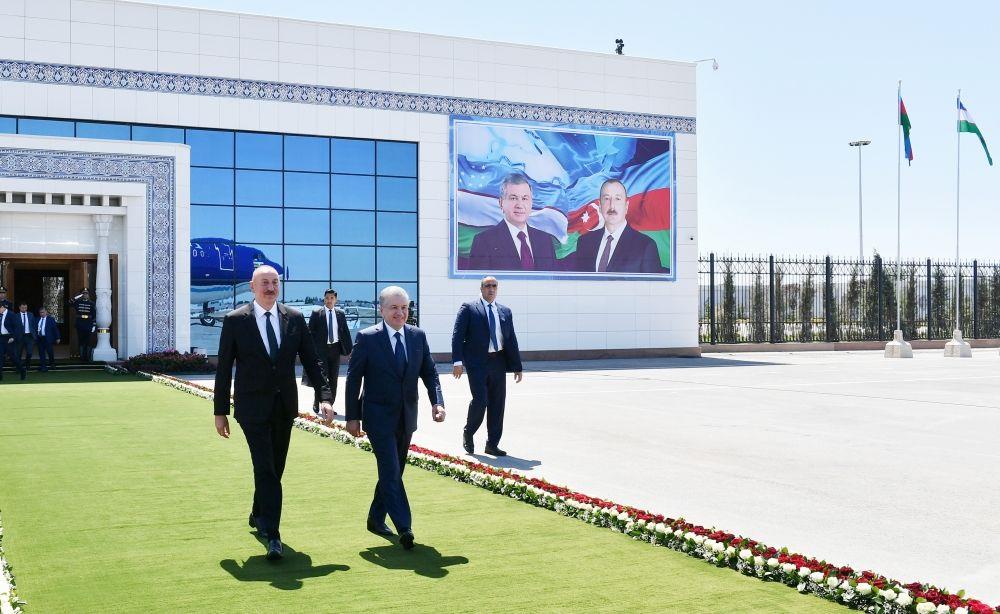
Azerbaijan Looks Eastward For Consolidation In The West
By Orkhan Amashov
Woven into a web of commonalities by virtue of a shared Soviet-Russian past, and by deeper Turkic-Islamic ties, Azerbaijan and Uzbekistan seem to be readying themselves to make landmark strides in bilateral relations.
Milestone is a word that is quite often overused as to become a trite cliche. But not here. President Ilham Aliyev's trip to Uzbekistan was not an ordinary top-level sojourn, but a historic breakthrough in which, in subtle tones, it was acknowledged that some opportunities are providing massive scope for improvement and that all-embracing growth in connectivity is an absolute necessity.
President Shavkat Mirziyoyev called Azerbaijan“a time-tested reliable strategic partner”, and praised the Azerbaijani leadership for“restoring historical justice by returning the ancestral lands”, in reference to the Second Karabakh War. President Aliyev thanked Tashkent for its support shown before, during, and after the 2020 campaign, and paid tribute to the reforming zeal demonstrated by his counterpart.
Commonalities
The two nations have never been estranged, nor have formed an odd couple. Quite the reverse, the relations have always been characterised by deep-entrenched reciprocal sympathy.
“There are external challenges that our countries and peoples have to face”, said the Azerbaijani president during the joint press conference. In fact, the two nations are similar, share comparable propensities and predicaments.
Both countries do not join political-military blocs and prefer measured aloofness in international affairs. Baku and Tashkent have signed a declaration of alliance with Russia and are careful not to antagonise Moscow, but nonetheless maintain an independent line in foreign policy, driven by their own exigencies.
As the most densely populated nations with the strongest armies in their respective regions, the South Caucasus and Central Asia, Azerbaijan and Uzbekistan are striving to augment their significance by occupying pivotal hubs within the East-West transport network.
Both are indispensable to Turkic unity. If Baku is a linchpin connecting Turkiye with Central Asia, Tashkent is probably the most aspirational force fully conscious of the geopolitical potential of the Organisation of Turkic States.
In Uzbek eyes, Azerbaijan is a conduit to the West, whereas strong ties with Tashkent provide access to Central Asia and China, enabling it to consequently add to its clout on the Western front.
Trade, investment and connectivity
Figures can always be fiddled, but they never deceive if resorted to in good faith. Azerbaijani trade turnover with Uzbekistan has gone from a relatively insignificant volume of $17.1 million in 2016 to $118.9 million in 2021, thereby increasing more than sixfold.
There are 253 Azerbaijani companies currently operational in Uzbekistan, and 53 Uzbek counterparts functional in Azerbaijan. The number of joint ventures has quadrupled over the past few years.
Baku and Tashkent have signed a package of investment agreements worth over half a billion dollars. The scope is all-embracing, incorporating oil and gas, petrochemicals, pharmaceuticals, construction materials, textile, viticulture and jewellery.
Connectivity looms large on the Azerbaijani-Uzbek agenda but is in dire need of upgrading. Both rail and highway legs of the wider transport infrastructure need to be overhauled and remodified.
In this vein, the shifting sands in Eurasia offer a tangible promise. Against the backdrop of international volatility over the Ukrainian crisis, China-Europe cargo transport is going down South to the Middle Corridor, otherwise known as the Trans-Caspian International Transport Route (TCITR).
China, which is the original initiator of the grand scheme, is naturally most interested in this shift, as is Ankara. In late 2021, Adil Karaismailoglu, Transport Minister of Turkiye, stated that Ankara would aim to shift 30 percent of the volumes currently going through Russia and the Northern Route to the Middle Corridor.
The Southern Route provides the shortest connection between Asia-Pacific, South Asia and Europe, but also features more border crossings and requires multi-modal transfers to cross the sea.
For Uzbekistan, which is landlocked with no direct access to the Caspian basin, the mega-project in question is of a near-existential import in economic terms. For Azerbaijan, which is working flat out and round the clock to press ahead with its regional brainchild – the Zangazur Corridor – it offers glittering prospects.
Far away from being given to bombastic asseverations, President Aliyev's recent trip to Uzbekistan ushered in a revolutionary new age in bilateral relations. The impetus is there, and during the course of a forthcoming critical phase, the observer will be in a better position to appreciate the further intensification of the momentum engendered.
---
Follow us on Twitter @AzerNewsAz
- Tags:
- Ilham Aliyev
- Uzbekistan
- Azerbaijan President
- East-West
- Azerbaijan- Uzbekistan
Legal Disclaimer:
MENAFN provides the
information “as is” without warranty of any kind. We do not accept
any responsibility or liability for the accuracy, content, images,
videos, licenses, completeness, legality, or reliability of the information
contained in this article. If you have any complaints or copyright
issues related to this article, kindly contact the provider above.
















Comments
No comment